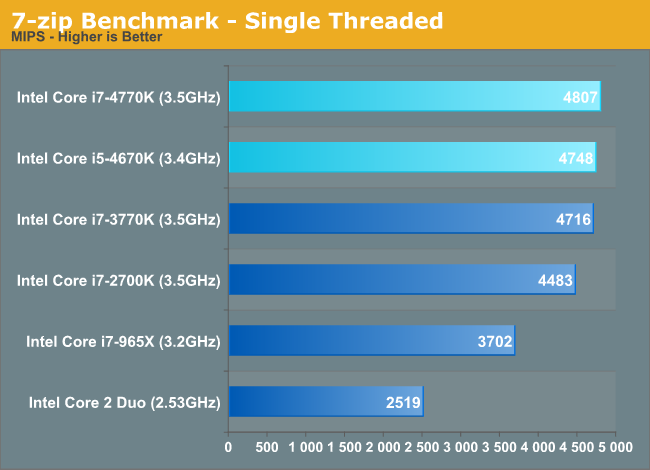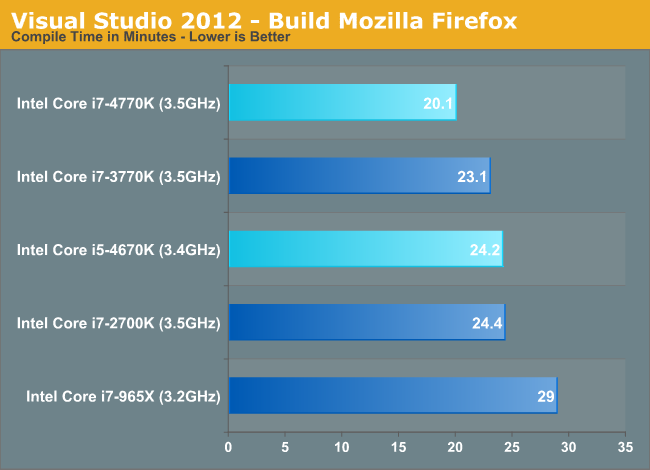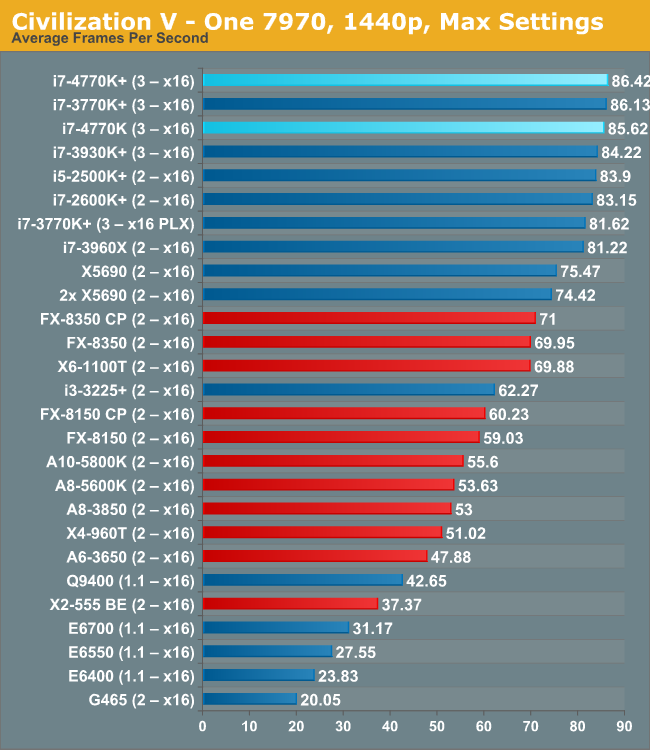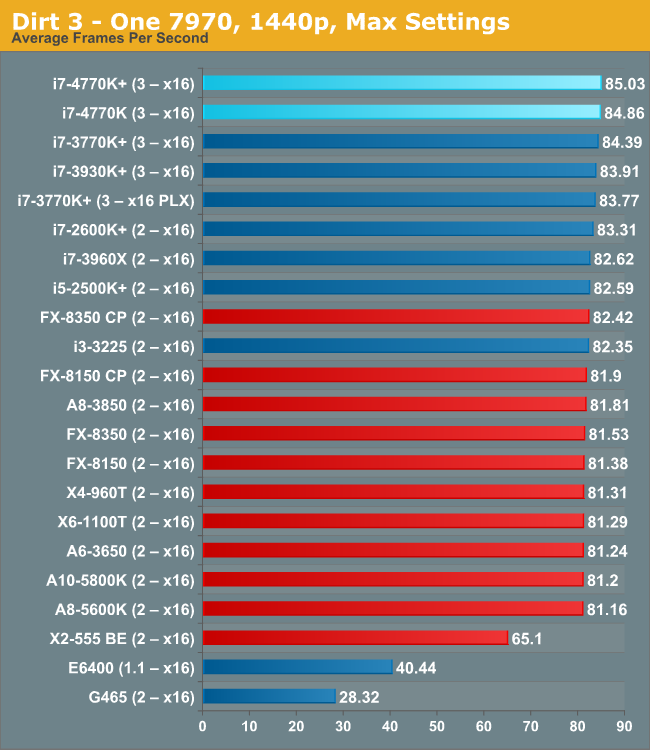The Haswell Review: Intel Core i7-4770K & i5-4670K Tested
by Anand Lal Shimpi on June 1, 2013 10:00 AM ESTCPU Performance: Five Generations of Intel CPUs Compared
For the purposes of our look at Haswell, we will be breaking up our review coverage into two parts. The rest of this article will focus on the CPU side of Haswell, while coverage of the GPU - including Iris Pro and Crystalwell - has been spun off into another artice: Intel Iris Pro 5200 Graphics Review: Core i7-4950HQ Tested.
The majority of the market doesn’t upgrade annually, so I went back a total of five generations to characterize Haswell’s CPU performance. Everything from a 2.53GHz Core 2 Duo through Nehalem, Sandy Bridge, Ivy Bridge and Haswell are represented here. With the exception of the Core 2 platform, everything else is running at or near the peak launch frequency for the chip.
In general, I saw performance gains over Ivy Bridge of 1 - 19%, with an average improvement of 8.3%. Some of the performance gains were actually quite impressive. The 7.8% increase in Kraken shows there’s still room for improvement in lightly threaded performance, while the double digit FP performance gains in POV-Ray and x264 HD really play to Haswell’s strengths.
Compared to Sandy Bridge, Haswell looks even more impressive. The Core i7-4770K outperforms the i7-2700K by 7 - 26%, with an average performance advantage of 17%. The gains over Sandy Bridge aren’t large enough to make upgrading from a Sandy Bridge i7 to a Haswell i5 worthwhile though, as you still give up a lot if you go from 8 to 4 threads on a quad-core part running heavily threaded workloads.
Compared to Nehalem the gains average almost 44%.











Quite possibly the most surprising was just how consistent (and large) the performance improvements were in our Visual Studio 2012 compile test. With a 15% increase in performance vs. Ivy Bridge at the same frequencies, what we’re looking at here is the perfect example of Haswell’s IPC increases manifesting in a real-world benchmark.
Gaming Performance
After spending far too much time on the Iris Pro test system, I didn’t have a ton of time left over to do a lot of gaming performance testing with Haswell. Luckily Ian had his gaming performance test data already in the engine, so I borrowed a couple of graphs.
As expected, Haswell is incrementally quicker in GPU bound gaming scenarios compared to Ivy Bridge - and most definitely at the top of the charts.












210 Comments
View All Comments
random2 - Monday, June 3, 2013 - link
Other reviewers are getting the more standard 10-15% difference on average across the board typically seen with Intel and a new gen. introduction over their previous gen. If it's not being seen here, maybe there are benches not included that should be.Achaios - Tuesday, June 4, 2013 - link
1.72 FPS difference between an i7-2600k and an i7-4770k. This is so hopelessly pathetic.My QX9650 and my Asus P5Q Deluxe just got a 2 year life extension. I wonder when it's going to be worth it to finally ditch my 2008 system!!!
Arbie - Wednesday, June 12, 2013 - link
The CPU does not control the FPS you're talking about. Beyond a certain point of CPU power (long ago passed) FPS depends on the external graphics card. A Haswell i7-4770K CPU will, according to the Anandtech benchmarks, be about twice as powerful as your QX9650. At 1/3 the cost, and far less idle power. That's not "pathetic".You may very well not want to upgrade, because you won't see a difference in your games - but that isn't Intel's fault. In fact it's a problem for them and the desktop market in general. Gains in CPU power are becoming irrelevant. As are PC games, BTW, which is why graphics cards are improving so slowly now. In two more years... it will be the same story, except more so.
monohouse - Sunday, June 23, 2013 - link
+1, I upgraded my system:from a E6750 (3800 Mhz, 4MB) to E8400 (4300 Mhz, 6MB)
from GTX 480 (840 Mhz, 1.5 GB) to GTX 580 (930 Mhz, 3 GB)
and got the same FPS in crysis 2 (with MaLDo HD + hi-res textures + DX11)
shows that in some cases, there is no improvement
Gastoncapo - Wednesday, June 5, 2013 - link
honestly, i'm still running my 2500k @5ghz ...i don't see the point in upgrading yet, guess i'll just switch my 580 gtx for a 780 :DNillerboy - Sunday, June 9, 2013 - link
will there be made a review of Intel 4770S?I am considering making a lab with this cpu, and would like to see proformence difference between the Intel 4770 and 4770S.
C433 - Wednesday, June 12, 2013 - link
second this, best would be to also include 4670S and at least one of the T modelsThomasS31 - Monday, June 10, 2013 - link
Anand,What is intels response to the overheating/throttling issues with stock cooler haswell (not OC).
Can you investigate this issue more (as you can as ususal).
Seems there are some manufacturing quality issues with the heat spreader and thermal paste.
Arbie - Wednesday, June 12, 2013 - link
Just some info for others considering a Haswell desktop build.I have just assembled an i5-4670K on an Asus Gryphon Z87 mATX mobo, with 8GB of Corsair Vengenace RAM (1333MHz) and a GTX 650ti graphics board. This is with a 250GB Samsung SSD and a old 500GB mechanical drive. The PSU is a Corsair CX600 80-Plus.
==> At stock clocks, idling on the Windows desktop, this PC pulls only 39W from the wall!
I am amazed. Idle power is important to me since the box is in a poorly-ventilated room. Upping the AC to improve that area would freeze the rest of the house AND cost a bundle. The time periods spent at full load are negligible in comparison. But the performance is there when needed... this CPU is nearly twice as powerful as my Yorkfield build, which idles at 170W, with HD 5770 gfx and an SSD.
So I'm very pleased with Haswell on the desktop. And yes, I could have bought a lower level chip and mobo for this use, saving money and a few more Watts, but I wanted the good stuff and the PC may someday be moved to where an OC would be practical.
emperius - Friday, June 14, 2013 - link
Well I certainly can wait for AMD to truly boost their competition from Sony and Microsoft's budget here. Let's face it, multi-year contract for console apu's should economically boost them massively.